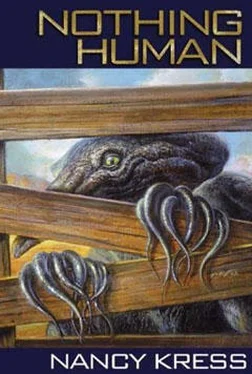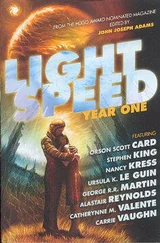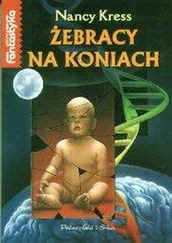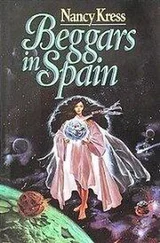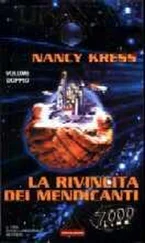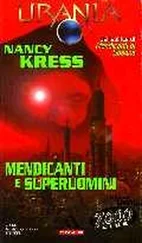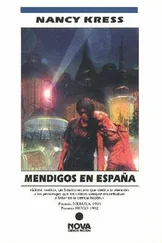That was part of the price she was paying.
She sat in the cottonwood shade, watching a lizard bask on a sunlit rock beside the creek. Lillie wasn’t much of a naturalist, and lizards interested her even less than jackrabbits or wildflowers, but it seemed to her there was something odd about this lizard. Its color? Shape? She didn’t know. She looked across the creek at the strip of wildflowers hugging the bank, and she felt reassured. Purple vervain, blue gila, yellow columbine. Tess had taught her the names. The flowers all looked normal.
“Lillie?”
“Hello, DeWayne.”
He sat down awkwardly beside her, pulling up the non-existent crease on his trousers—even, she thought, after a decade on the farm. Of everyone, DeWayne was the least comfortable out of doors. He said, “I think you know why I’m here, Lillie.”
“Yes. I do. When do they want me to leave?”
“Not until after the… your babies are born.”
She’d hoped for that. “Who’s going with me?”
“Keith and Loni. Spring and Julie and all their kids. Roy and Felicity. Lupe and Juan and Alex.”
Alex was a surprise. She said steadily, “Not Cord.”
DeWayne didn’t look at her. “He would have, I think. But Clari…”
“I know.” Timid Clari, who always let Cord have his way. But not now, not when she had her son to, as she saw it, protect. Lillie understood.
“And not Kella, either,” DeWayne said.
“I didn’t expect Kella. I’m glad to have Keith.” Always her most adventurous child.
DeWayne said, “You’ll have enough people to survive if you go up toward the mountains. There are so few people left that you can probably have your pick of houses. Jody is more than willing to supply you with a few cattle, plus chickens and seed. Rafe thinks he can get you on-line with us, using that old equipment in the storeroom, and you can summon help if you ever need it. We’ll do everything we can, Lillie.”
“Except let me stay here. You don’t want my kids around your kids.”
“No,” DeWayne said, and still he didn’t face her. “We don’t.”
“It isn’t your kids who will object to the new humans, you know. Kids accept whatever is around them as normal. It’s you adults.”
“I know,” DeWayne said. He hesitated. “Do you know what they’ll look like? Has Pam even told you?”
Pam had, but Lillie was not about to tell DeWayne. “No.”
He burst out suddenly, “Lillie—how can you?”
“DeWayne, look at me.” He did, reluctantly. She noticed for the first time how furrowed his brown face looked, as if it were he, and not Jody or Spring, who spent most of the time in the sun. Genes were strange things.
She said, “How can I? Because I have to. Or, rather, somebody has to, or we risk extinction. Like dinosaurs, like mastodons, like saber-toothed tigers. If I had another choice besides extinction, I’d take it. But I don’t.”
“Yes, you do. Go on adapting, the way we have been so far, maybe with a little help from the pribir. You don’t know that the climate’s going to make that impossible. You don’t know.”
I know, Lillie thought. The pribir, damn them, had never been wrong yet. Except about how human beings would behave, and Lillie wasn’t sure she could blame them for that. Humans themselves weren’t very good at predicting their own behavior.
Aloud she said, “Then call my choice an insurance policy. If humans in our present form go extinct, the new humans will take up where we left off. If we don’t, then surely the Earth is empty enough to hold two strains of humans.”
DeWayne said somberly, “It didn’t once before. Homo sapiens killed off the Neanderthals.”
So that was their real fear. Lillie could have told him it wouldn’t happen that way, but she knew that was the one piece of information about which she absolutely must lie. Would he ask the question?
He did. “Emily wanted me to ask you something, and I said I would. If…”
“Spit it out, DeWayne.”
“If they ever wanted to… will your ‘New Humans’ be able to mate with our descendants?”
“No,” Lillie lied. And if Emily actually believed that, she was a fool. The pribir would not only ensure compatibility, they would ensure genetic dominance, and Emily knew it. But Lillie wouldn’t give Emily that weapon for her arsenal.
Even DeWayne, no geneticist, looked unconvinced. He sighed heavily and stood. “I’m sorry about all this, Lillie.”
She merely smiled up at him.
“They won’t be human, you know. Your kids. No matter what you call them. There are limits.”
“And can you say for sure where they are, DeWayne? The limits of being human include Cord and Taneesha, with all their genemods, most of which we haven’t even seen expressed, but those limits don’t include the next batch of genetic engineering? Who decided that?”
He said nothing, turned and walked from under the shade of the cottonwoods and over the rise to the big house.
Lillie stayed on the bench. Sometime during the human conversation, the lizard had quietly left its rock. She should feel somber, Lillie thought, but she didn’t. Amusement flooded her like water.
All her life she’d wanted the universe to have a design, to make sense, and she herself to have a mission within that design. Now Pam and Pete, tunnel-visioned carriers of their own mission, had given her one: to save the human race. Or, at least, to play a part in that rescue. And it had nothing to do with any grand universal design anywhere.
Lillie had a sudden vision of the entire empty, depopulated planet, falling toward ecological ruin. Beyond it, the rest of the solar system, the galaxy, the local group… all that stuff they’d taught her in school. Huge unimaginable distances filled with an infinity of suns and worlds, and all of them were hurtling toward eventual ruin. Novas, burn-outs, maybe even—what had Rafe called it once? —she couldn’t remember the word but it meant that everything in the universe would eventually run down and stop. Everything was going to go extinct, and in the face of that there were no missions in life. Humanity, old or ‘new,’ was just an eyeblink that hardly anyone except two egomaniacal aliens would even notice.
Oddly, this not only amused Lillie but refreshed her. It was comforting. She’d never needed a grand mission at all. All she’d needed was to live whatever life circumstances presented to her, and she was automatically a part of the universe. Nothing she did could ever make that part any bigger, not on the true infinite scale of things. That implied that nothing could make her part any smaller, either. She was already as counted in the cosmic census as possible, already part of whatever salvation was possible. Not the religious salvation her mother had believed in, but the salvation of the great march of evolution, the only point the universe had.
She rose, stretched lazily, and watched a jackrabbit tear across the open spaces and into the mesquite. She felt amazingly refreshed. She wished she could tell Uncle Keith; he’d have enjoyed knowing.
With the careful gait of pregnancy, she walked up the rise toward the farm.
“Breathe, damn it!” Pam said. “Breathe harder, Lillie!”
She managed to get out, “You should have… made the head… smaller.”
“Can’t do that,” Pete said. “Not without loss of cranial capacity for intelligence. There are some design features we were stuck with, you know.” He sounded put out.
“Breathe, don’t push yet! Fuck it, Lillie, you’ve done this before!”
And it wasn’t any fun then, either, Lillie thought, between waves of pain. But Pam was right. It was too early to push.
She lay inside the ship, but that didn’t seem to make labor any easier. Pam had refused to give her any drugs. Surely the pribir could have created molecules to block pain centers in the brain without affecting the babies, but they hadn’t. Why? Lillie hadn’t thought to ask before, and now it was too late. Maybe they wanted to see how New Human births would go after the pribir departure.
Читать дальше
